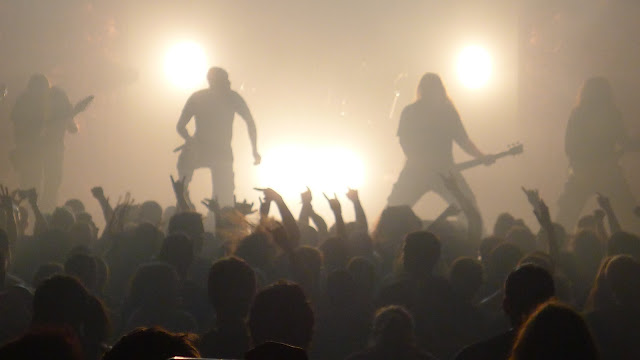The
term "heavy metal" was first used in a musical sense in the '60s
song ‘Born to Be Wild’ by Steppenwolf when they referred to "heavy metal
thunder." The genre was derived from blues-rock
and psychedelia of the late '60s and began in prototype
form with Black Sabbath.
Metal
is a hugely diverse genre which can incorporate the melodic, the atmospheric,
the avant-garde, the complex, and the out-and-out pummelling. It is so varied
that there is very little (sonically) in common between the full-frontal attack
of death metal and the gentle hurdy-gurdiness of European folk metal. The genre
is the most inclusive 'world music' bar none. Despite the lack of radio airplay or
MTV exposure, metal remains a vital force in music today, with sell-out concert
tours and CDs selling impressive numbers of copies.
 |
| Ronnie James Dio popularized the sign of the horns in heavy metal. |
Since
its genesis, metal music has been an ‘outsider art,’ looking inside society from
the basic position of ‘I don't like what I see.’ Metal appeals to the darker recesses of
human nature. Society fears the outsider and aims to suppress or hide
humanity's dark side.
The majority among the population
just want a catchy beat- because it's easy, turn on the radio
and there it is. Finding great music takes a lot of time to dig through and a good
chunk of the people just don't care to do so.
The top-40 radio is the poppy end of the scale, easily recognizable and
simplistic, repetitive melodies, lyrics and concepts which your average, not
particularly fussed, music fan can understand.
There
are plenty of reasons why the mainstream press won't touch it though. For a
start, the ten-minute epics, complex song structures, and odd timing used by
bands like Tool or others, does not generally lend itself to radio play
or the dance floor.
Most
people don't really understand what metal is about and can't get past the
noise, aggression and perceived lack of melody. It takes either a concerted
effort or repeated exposure to get into and appreciate metal. Often with metal,
the more commercial it is, it is inevitably a watered-down version; metal is an extreme and confrontational sound that
if watered-down would simply not be metal anymore.
 |
| Distribution of Metal bands by countries |
What
is quite irksome is the sheer narrow-mindedness of people who say things like 'all
metal is rubbish and nothing will convince me otherwise', or ‘metal is
for dummies, it all sounds the same, it's for adolescent males, etc.’ I fail to see how
people can praise ‘musicians’ like LMFAO who sing banal lyrics about partying
or, syrupy slop of auto-tuned nothingness of Akon and Black Eyed Peas; yet say
that bands like Gojira, who write music far surpassing mainstream bands
in its virtuosity and complexity, are bereft of musical merit.
The
general public has held a stereotype of metal fans being suicidically depressed
and a danger to themselves and society in general. Not all metal-heads are
sociopathic trench coat-wearing outsiders; people are often shocked when I
mention my music tastes as outwardly I am pretty far away from most people's
idea of a metal-head. No tattoos, no piercings- pretty ordinary, in fact.
In
terms of skill, it is very intricate, and one of the most difficult forms of music
to play. When it comes to bands like Opeth, the music can be like
mini-symphonies, and the arrangements share a lot with classical music and jazz,
including a lot of the keys and scales. It's not always easy to listen to, and
like any genre, metal has some awful pap. The difference tends to be that those
who are not into metal seem only to identify metal with some of the worst
stuff. Metal is a genre that's easy to mock, but it's also hugely fun and
welcoming. And the skill with which most musicians ply their trade is simply
breathtaking.
 |
| Swedish extreme metal band Meshuggah playing at a concert. |
Unlike
other genres, metal bands have a tendency to be very long lived while most
popular artists come and go. Now, imagine what it would mean for the music
industry was forced to negotiate mostly with highly successful metal
artists who have a large fan base. Such artists would have a much stronger
position in negotiations than ‘one hit wonders’. I cannot imagine that the record
industry likes this thought. There is longevity in most rock/metal bands,
whereas the tripe in the charts is made just for a quick fix.
Then
there’s the fashion
element. In metal, there is no requirement for fans
to submit to it, nor is it changing fast. In other words: there is simply no
pressure for fans to always buy the latest metal fashion and THAT is really bad
news for fashion designers! The hip-hop fashion seems to be changing regularly
while the two biggest developments in metal were the disappearance of spandex
pants and the abandonment of ‘hair spray’. To me, this does not sound as if metal fashion
could ever be a big earner.
The
‘proud to be ugly’ attitude that you find a lot in the metal scene only adds up
to this. On a serious note, how do you want to get a music scene excited about
‘good looks’ when most fans could not care less about whether somebody has a
pot belly or not? Different looking individuals and bands are thought of as
just that - different. Image counts for very little in metal - the fans can see
beyond the image where the music is all-important, something that in pop music
by definition will never happen.
In
spite of having clocked more than 40 years of existence, the genre has
continued to captivate the attention of fans of all ages, all over the planet.
It will continue to do so for a long time to come; a very long time to come.
\m/





